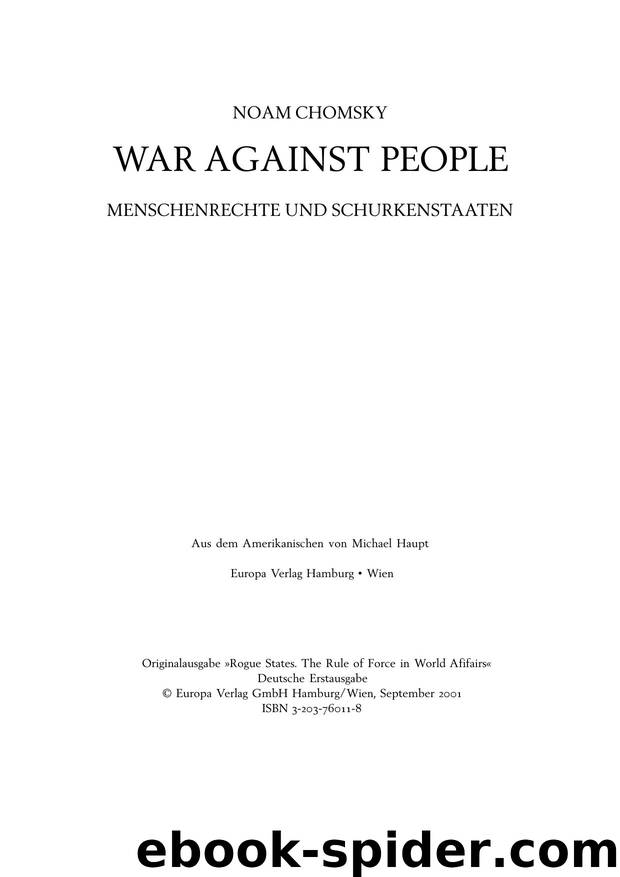War against people by Noam Chomsky

Autor:Noam Chomsky [Chomsky, Noam]
Die sprache: deu
Format: epub
veröffentlicht: 0101-01-01T00:00:00+00:00
1999.
11 Stanley, NYT, 22. Jan. 1999.
12 Wischinski zit. nach David Manasian, »Human-Rights Law: The Con-science of Mankind«,
Economist, 5. Dez. 1998; Kirkpatrick zit. nach Joseph Wronka,»Human Rights«, in R. Edwards
(Hg.), Encyclopedia of Social Work (Washington DC: NASW, 1995), S. 1405-1418. Vgl. auch
Wronka, Human Rights and Social Policy in the 21st Century (Univ. Press of America, 1992)
und »A little Humility, Please«, Harvard International Review (Sommer 1998). Morris Abram,
Erklärung vor der UN-Menschen-rechtskommission in Sachen: Punkt 8, »The Right to Devel-
opment«, 11. Feb. 1991.
13 Amnesty International-London, United States of America: Rights for All (Okt. 1998). Vgl.
das Interview, das Dennis Bernstein und Larry Everest mit Pierre Sane, dem Generalsekretär
von Amnesty, führten, Z magazine (Jan. 1999), eine der seltenen Äußerung gegen den Main-
stream, die nur im Umfeld der radikalen Dissidenten wahrgenommen wird.
14 Lawrence Mishel, Jared Bernstein, John Schmitt, The State of Working America 1998-
1999 (Cornell Univ. Press, 1999). Zu diesen Themen vgl. auch Phineas Baxandall und Marc
Breslow, Dollars and Sense, Jan./Feb. 1999 (dort Zitate aus OECD, Annual Employment Out-
look, 1998). Sinkende Vermögenswerte: Edward Wolffs Untersuchungen werden zitiert von
Aaron Bernstein, »A Sinking Tide Does Not Lower All Boats«, BW, 14. Sept. 1998. Zur straflos
bleibenden Kriminalität englischer Konzerne vgl. Gary Slapper, Blood in the Bank (Ashgate,
1999).
15 Zwei von vielen neueren Beispielen: Gerald Baker, FT, 14. Dez. 1998, der auch auf mögliche
Fehlentwicklungen hinweist; ferner Reed Ablesen, ATF7;2.Jan.l999.
16 James Bennet, »At a Conference on Wall Street Diversity, the President Finds His Own
Stock Soaring«, NYT, 16. Jan. 1999.
17 Alan Greenspan zit. nach Edward Herman vom 22. Juli 1997, Anhörungen vor dem Kongreß,
»The Threat of Globalization«, New Politics 26 (Winter 1999). Gene Koretz, »Which Way are
Wages Headed«, BW, 21. Sept. 1998. Zur Lohnentwicklung von 1994 vgl. Robert Pollin und
Stephanie Luce, The Living Wage (New Press, 1998). Zu Löhnen und gewerkschaftlicher
Organisierung vgl. Mishel u. a., State of Working America sowie frühere Untersuchungen
dieser zweijährlich erscheinenden Reihe des Economics Policy Institute.
18 Louis Uchitelle, »The Rehabilitation of Morning in America«, NYT, 23. Feb. 1997.
19 Joseph Stiglitz, »Some Lessons from the East Asian Miracle«, World Bank Research Ob-
server 11:2 (Aug. 1996); »An Agenda for Deveiopment in the Twenty-First Century«, Annual
World Bank Report on Deveiopment Economics (World Bank, 1998); WIDER Annual Lec-
tures 2, UN University and World Institute for Deveiopment Economics Research, Mai 1997.
David Felix, »Is the Drive Toward Free-Market Globalization Stalling?« Latin American Re-
search Review 33:3 (1998).
20 Eichengreen, Globalizing Capital: A History of the International Monetary System
(Princeton Univ. Press, 1996).
21 Survey ofCurrent Business 76:12 (Washington DC: US Dept. of Commer-ce, Dez. 1996).
22 Morton J. Horwitz, The Transformation of American Law 18701960 (Oxford, 1992).
23 »Looking for New Leadership«, Newsweek International, 1. Feb. 1999.
24 Zu den interessanten Diskussionen über das MAI vgl. Chomsky, Profit OverPeople.
25 Alan Story, »Property in International Law«, Journal of Political Philoso-phy 6:3 (1998), S.
306-333.
26 Christopher Hill, Liberty Against the Law (Penguin, 1996), S. 229.
27 Center for Responsive Politics, zit. nach Dollars and Sense (Jan./Feb. 1999).
28 Bernays, Propaganda (Liveright, 1928). Vgl. Alex Carey, Taking the Risk Out of Democracy
(Univ. of New South Wales Press, 1995 und Univ. of Illinois Press, 1997); Elizabeth Fones-
Wolf, Selling Free Enterprise: The Business Assault on Labor and Liberalism, 19451960
(Univ.
Download
Diese Site speichert keine Dateien auf ihrem Server. Wir indizieren und verlinken nur Inhalte von anderen Websites zur Verfügung gestellt. Wenden Sie sich an die Inhaltsanbieter, um etwaige urheberrechtlich geschützte Inhalte zu entfernen, und senden Sie uns eine E-Mail. Wir werden die entsprechenden Links oder Inhalte umgehend entfernen.
25 by Der Ewige Krieg(1427)
Alles mit ihm (German Edition) by B.G. Thomas(1346)
03 by Peter Läpple(1332)
06 by Peter Läpple(1310)
058 by Der Kampf um den Ring(1309)
Die Vermessung der Psychiatrie by Stefan Weinmann(1251)
050 by Das Hotel der Toten(1250)
Über das Sterben by Gian Domenico Borasio(1234)
Eine perfekte Familie by A.K. Alexander(1225)
Die Biene Maja by Waldemar Bonsels(1224)
2590 by Der Tote und der Sterbende(1216)
Zeit by Stefan Klein(1214)
2568 by ZJ(1213)
0111 - Geschäfte mit Menschen by Geschäfte mit Menschen(1208)
Eine perfekte Familie by Alexander A.K(1205)
2569 by Das goldene Zeitalter(1180)
Permanent Record: Meine Geschichte (German Edition) by Snowden Edward(1167)
Maia by Richard Adams(1157)
Titan 13 by Unknown(1141)
